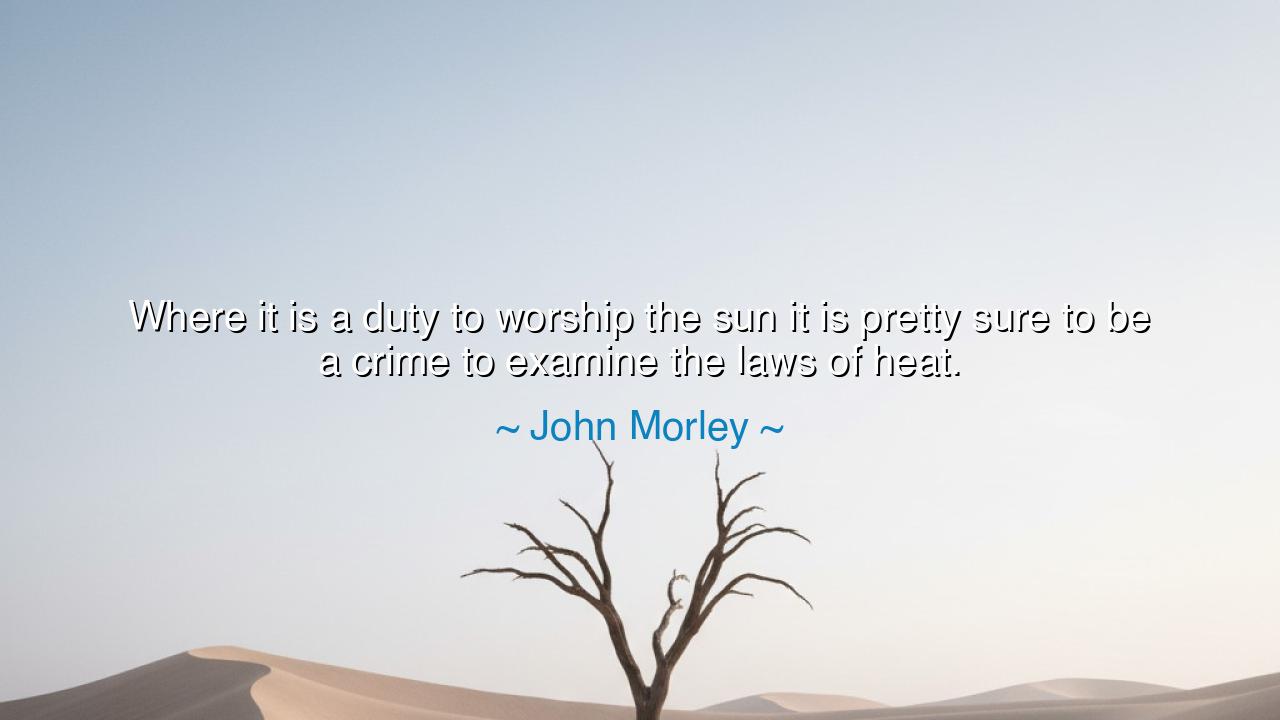
Where it is a duty to worship the sun it is pretty sure to be a
Where it is a duty to worship the sun it is pretty sure to be a crime to examine the laws of heat.






“Where it is a duty to worship the sun it is pretty sure to be a crime to examine the laws of heat.” — Thus wrote John Morley, the English statesman, philosopher, and defender of intellectual freedom. In this brilliant sentence, he unveils one of the oldest struggles in human history — the tension between dogma and discovery, between faith imposed and truth pursued. With a poet’s wit and a sage’s clarity, Morley reminds us that wherever blind worship replaces understanding, inquiry becomes dangerous; that when men are commanded to adore rather than to question, their minds are no longer free, and truth becomes a forbidden flame.
The origin of this quote lies in the intellectual climate of the nineteenth century — an age of both enlightenment and repression. John Morley lived in a world where science was beginning to pierce the mysteries of nature, yet many institutions feared that such knowledge would threaten their power. His words were not aimed at religion itself, but at the tyranny of unquestioned belief, whether religious, political, or cultural. He saw that when reverence hardens into ritual and awe turns into obedience, the spirit of curiosity — that divine spark within man — is snuffed out. In such lands, it is not only the sun that is worshiped, but ignorance itself.
To worship the sun, in Morley’s metaphor, is to cling to symbols without seeking their meaning. It is to praise the brightness but forbid the study of its light. The “laws of heat” represent reason, observation, and the courage to ask why. Morley knew that progress depends upon those who dare to question, who risk censure and exile in the pursuit of knowledge. Yet in societies where authority is sacred and doubt is sin, such men and women are branded as heretics. History, he implies, is littered with the ashes of thinkers burned for daring to touch the truth.
Consider the fate of Galileo Galilei, the astronomer who turned his telescope toward the heavens and found that the earth was not the center of creation. His discovery did not deny the glory of God — it revealed it in deeper form — yet the world of his time condemned him. He had, in Morley’s words, “examined the laws of heat” where men still worshiped the “sun.” He was forced to kneel before his accusers and recant, whispering, “And yet it moves.” In that whisper lies the triumph of truth over tyranny — for though they silenced his tongue, they could not chain his reason.
Morley’s insight extends beyond religion. It speaks to all systems — political, social, even cultural — where obedience replaces understanding. Wherever questioning authority is punished, ignorance becomes sanctified. The same spirit that condemned Galileo has appeared in every age: when thinkers are censored, when books are burned, when truth-tellers are silenced because their words unsettle the comfortable. The worship may change — from the sun to the flag, from the priest to the party — but the crime remains the same: to examine, to doubt, to think.
Yet Morley’s message is not despair but awakening. He calls upon every soul to remember that reason is not rebellion — it is reverence of the highest kind. To seek understanding is to honor the Creator’s design, for truth, wherever found, is sacred. The great thinkers of every age — Socrates, Newton, Darwin, Curie — were not destroyers of faith, but servants of wonder. They refused to bow before ignorance; they stood in the light, even when it blinded them. Such courage is the duty of every generation: to question without arrogance, to believe without blindness, to balance reverence with reason.
Therefore, dear listener, take this teaching to heart: never fear to examine that which you are told to worship. For love of truth does not destroy faith — it purifies it. When you study the “laws of heat,” you do not diminish the sun; you learn to understand its glory more deeply. So too in life: question your traditions, your leaders, even your own assumptions. Let curiosity be your prayer, and understanding your offering. For truth fears no light, and faith that cannot endure inquiry was never faith at all.
This, then, is the eternal wisdom of John Morley — that freedom of thought is the breath of the soul, and that civilizations die not from lack of faith, but from fear of knowledge. Let us not be worshipers of suns, content with their glow; let us be seekers of light, who understand its laws and use them to warm, not to burn. For only in such courage — the courage to know — can humanity rise from worship to wisdom, from bondage to truth, and from darkness into the fullness of dawn.






AAdministratorAdministrator
Welcome, honored guests. Please leave a comment, we will respond soon